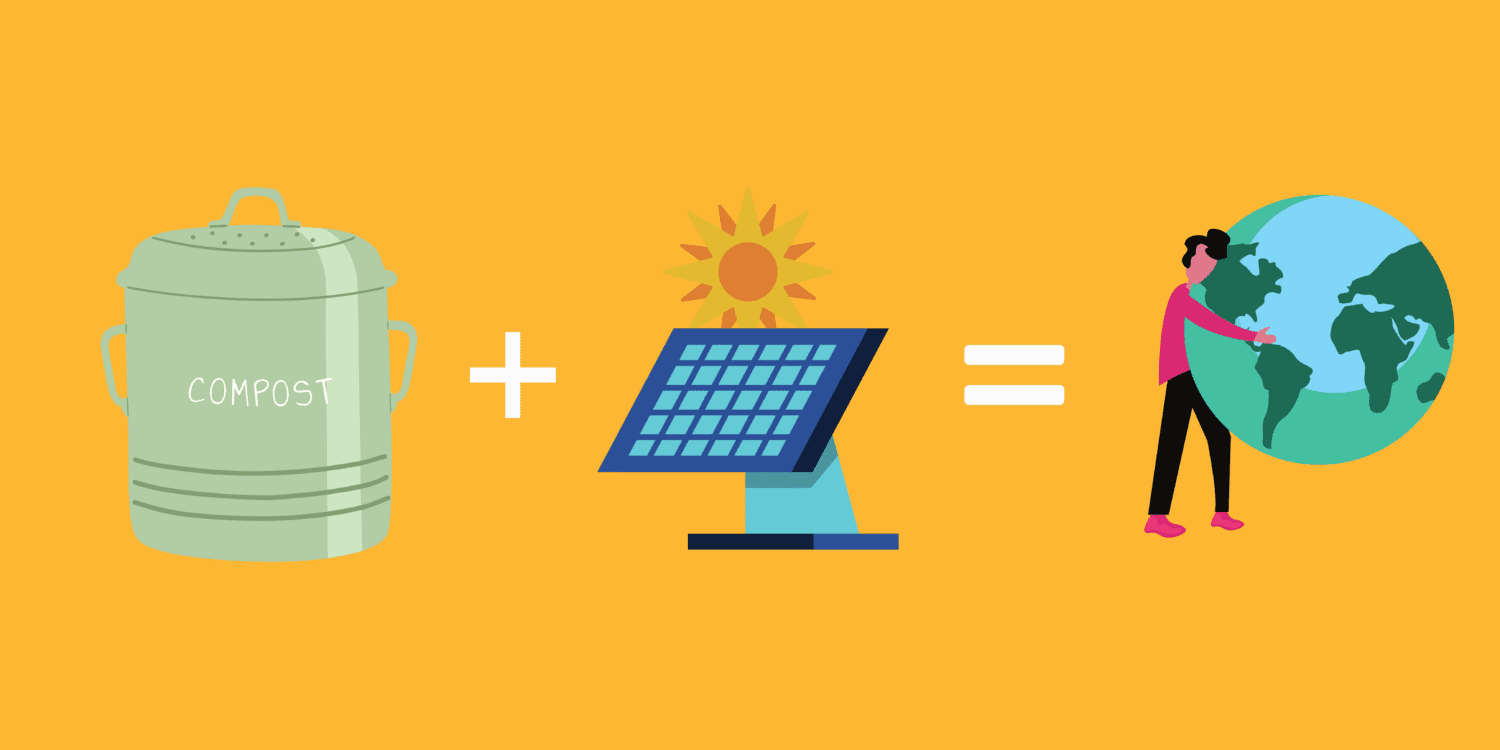
What do composting and community solar have in common? They’re both convenient ways for you to help yourself and the planet by reducing your household’s environmental footprint.
Let’s be real– we’re not going to stop wasting food or using electricity any time soon, but we know these behaviors are harming us and our environment in a variety of ways. That dissonance can weigh heavily on people who are trying to reduce their footprint and live more sustainable lifestyles, but it doesn’t have to.
When it comes to the environmental impact of our current society, a lot of things feel like they’re out of our control. That can be really hard to cope with when the fossil fuel industry works so hard trying to convince us that our carbon footprints are our problem to solve instead of theirs. Fortunately, we do have some control over what comes into and out of our homes. And yes we mean homes– not houses– because we’re going to share two environmental solutions that you can adopt today, no matter what your living situation is.
Two of the best ways to significantly reduce the waste and pollution resulting from your household’s daily habits are composting your organic waste and sourcing clean energy.
In the U.S., more than one-third of the food produced for human consumption is wasted, taking up more space in landfills than any other material. When food decomposes in landfills, it emits methane (a greenhouse gas more than 25x as potent as carbon dioxide), but that’s not the only downside.
When we look at the bigger picture, it’s not just the food itself that was wasted. We must also take into account the many resources that went into growing, processing, and transporting the food– including agricultural land, water, pesticides, fertilizers, and energy. All these wasted resources directly lead to negative environmental impacts that harm us, such as greenhouse gas emissions and climate change; consumption and degradation of freshwater resources; loss of biodiversity and ecosystem services; and degradation of soil quality and air quality. Fortunately, the planet has a much better system in place to deal with organic waste, and it’s very simple.
Composting is nature’s waste management strategy, and let’s just say she knows what she’s doing. The widespread adoption of composting in modern society could help solve a lot of our most pressing environmental issues. Composting food prevents the methane emissions that would occur in landfills, but its benefits don’t stop there..
The finished product is known as compost, and it’s lovingly referred to by farmers as “black gold” because of how valuable it is when added to agricultural land (or even houseplants). When compost is applied to soil, it drastically improves the soil’s health by increasing the number of microbes present, allowing it to absorb more water, improve air quality, and even remove greenhouse gasses from our atmosphere. With the addition of compost, healthy soil can sequester carbon from the air through photosynthesis and store it in a stable form underground where it doesn’t exacerbate climate change.
Composting can take on a variety of forms based on the amount of effort and money you want to put into it: a backyard compost pile or tumbler; a small countertop bin that you drop off at a local composting site; or a curbside service that picks it up and drops off a clean bin every other week like Compost Crew.
When it comes to electricity, it often feels like there is no choice to be made– just pay your local utility company and hope they don’t suddenly raise their prices, right? And if you want clean energy, you have to have the resources and space to install solar panels on your rooftop. Well, that’s the old way of doing things— fortunately, it doesn’t have to be that way anymore.
With community solar, anyone who pays a utility bill can enjoy the cost savings and environmental benefits of clean energy, whether they’re a Low-Income Household, a renter, an apartment-dweller or anything in-between. Community solar subscribers are allotted a share of the solar energy generated by a local solar farm in their community. Each month, this clean energy appears on a customer’s utility bill at a discounted rate, and their share of clean energy is sent to their house through the same grid the utility company uses.
With community solar, everyone has the choice to support local clean energy and save money, rather than being at the mercy of polluting fossil fuel giants. It’s a win-win, saving customers money while positively impacting their community and the planet.
The best part? No fees, no installations, and no effort. All you need to do is pay a monthly bill (like you have always done), except it will be cheaper with community solar because of the clean energy credits.
Compost Crew is a locally-owned food scrap recycling business that offers clean and convenient composting services to thousands of businesses, organizations and residential customers throughout Maryland, Virginia and Washington D.C. Customers can even receive their finished compost to use it in their backyard or houseplants, bringing their food scraps full-circle. Neighborhood Sun is a Certified B Corp based in Montgomery County, Maryland, providing access to affordable, clean energy through community solar across more than 7 states. These two small impact-driven businesses have teamed up to show their customers new ways of reducing their household’s environmental impact that require minimal effort.
Written by Stephanie Monmoine
If you are getting solar from: